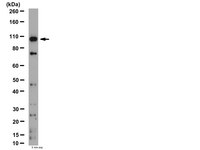AB6001 Sigma-AldrichAnti-MMP-9 Antibody, NT
Anti-MMP-9 Antibody, N-terminus is an antibody against MMP-9 for use in WB.
More>> Anti-MMP-9 Antibody, N-terminus is an antibody against MMP-9 for use in WB. Less<<Recommended Products
Overview
| Replacement Information |
|---|
Key Spec Table
| Species Reactivity | Key Applications | Host | Format | Antibody Type |
|---|---|---|---|---|
| H, R, Mk, Pm, Eq, Ca, Po | WB | Rb | Affinity Purified | Polyclonal Antibody |
| References |
|---|
| Product Information | |
|---|---|
| Format | Affinity Purified |
| HS Code | 3002 15 90 |
| Control |
|
| Presentation | Purified rabbit polyclonal in buffer containing 0.1 M Tris-Glycine (pH 7.4, 150 mM NaCl) with 0.05% sodium azide. |
| Quality Level | MQ100 |
| Applications | |
|---|---|
| Application | Anti-MMP-9 Antibody, N-terminus is an antibody against MMP-9 for use in WB. |
| Key Applications |
|
| Physicochemical Information |
|---|
| Dimensions |
|---|
| Materials Information |
|---|
| Toxicological Information |
|---|
| Safety Information according to GHS |
|---|
| Safety Information |
|---|
| Storage and Shipping Information | |
|---|---|
| Storage Conditions | Stable for 1 year at 2-8°C from date of receipt. |
| Packaging Information | |
|---|---|
| Material Size | 100 µg |
| Transport Information |
|---|
| Supplemental Information |
|---|
| Specifications |
|---|
| Global Trade Item Number | |
|---|---|
| Catalogue Number | GTIN |
| AB6001 | 04053252514685 |
Documentation
Required Licenses
| Title |
|---|
| PRODUCTO REGULADO POR LA SECRETARÍA DE SALUD |
Anti-MMP-9 Antibody, NT SDS
| Title |
|---|
Anti-MMP-9 Antibody, NT Certificates of Analysis
| Title | Lot Number |
|---|---|
| Anti-MMP-9, N-terminus - 2140066 | 2140066 |
| Anti-MMP-9, N-terminus - 2411907 | 2411907 |
| Anti-MMP-9, N-terminus - 2459053 | 2459053 |
| Anti-MMP-9, N-terminus - 1998944 | 1998944 |
| Anti-MMP-9, N-terminus - 2029643 | 2029643 |
| Anti-MMP-9, N-terminus - 2309346 | 2309346 |
| Anti-MMP-9, N-terminus - 2500558 | 2500558 |
| Anti-MMP-9, N-terminus - 3311777 | 3311777 |
| Anti-MMP-9, N-terminus - 4035060 | 4035060 |
| Anti-MMP-9, N-terminus - NG17342 | NG17342 |
References
| Reference overview | Pub Med ID |
|---|---|
| Synaptic plasticity mediating cocaine relapse requires matrix metalloproteinases. Smith, AC; Kupchik, YM; Scofield, MD; Gipson, CD; Wiggins, A; Thomas, CA; Kalivas, PW Nature neuroscience 17 1655-7 2014 Show Abstract | 25326689
 |







